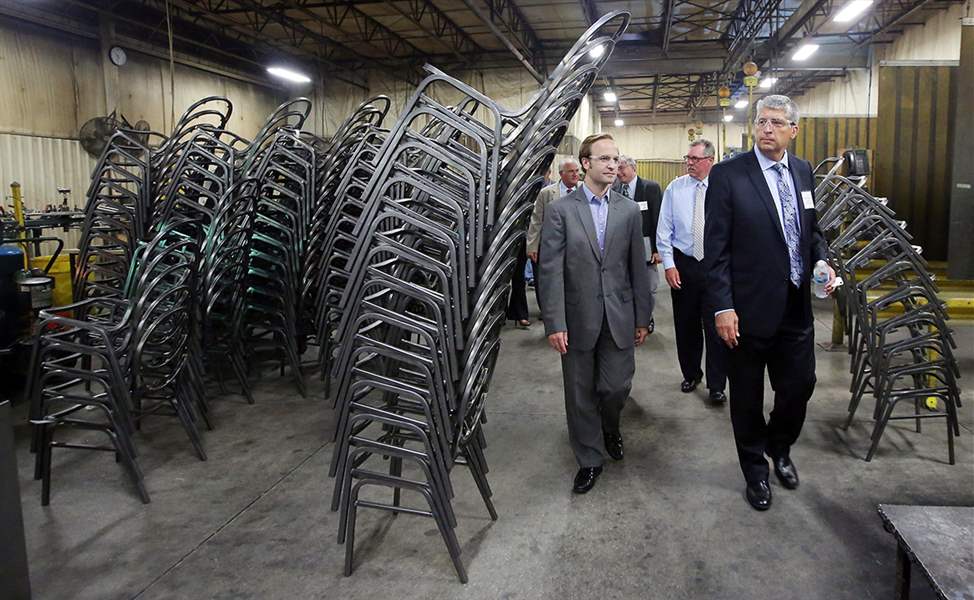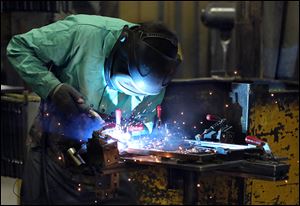
Mich. forum explores business-friendly ideas
Temperance firm hosts talk on state’s taxes
7/23/2014
Michigan Lt. Gov. Brian Calley, left, goes on a tour of MTS Seating in Temperance with company's president, Barton S. Kulish.
THE BLADE/JEREMY WADSWORTH
Buy This Image

Michigan Lt. Gov. Brian Calley, left, goes on a tour of MTS Seating in Temperance with company's president, Barton S. Kulish.
TEMPERANCE — Michigan Lt. Gov. Brian Calley visited a leading furniture manufacturer here on Tuesday to talk about his administration’s efforts to make the state more business friendly and to drum up support for an upcoming vote that would eliminate the state’s personal property tax.
Michigan businesses currently pay an annual tax on manufacturing and other equipment — even machinery that was bought and paid for decades ago. Opponents argue it penalizes investment and note that Michigan is the last Great Lakes state to have that type of tax. Ohio phased out its personal property tax in 2010.
“If you were to set up a tax system brand new you’d never do it that way,” Mr. Calley said.
Eliminating that tax, which is widely unpopular among business advocates, has been a key goal for him and Gov. Rick Snyder, a fellow Republican. The trouble, Mr. Calley said, is that the revenue it creates is important to local government budgets.
The administration thinks it has solved that problem. Earlier this year the Michigan legislature passed a proposal that would eliminate the tax for most business equipment but replace local government funding through savings from other, expiring tax breaks.
The legislation must still be approved by voters in the state’s August primary election.
MTS Seating, a 59-year-old manufacturer of custom seating for hotels, restaurants, convention centers, and other public venues, hosted the lieutenant governor’s roundtable discussion. Also in Temperance were Steve Arwood, the director of Michigan’s Department of Licensing and Regulatory Affairs, State Rep. Dale Zorn (R., Ida), Monroe County Economic Development Corp. chairman Tracy Oberleiter, and Monroe County Community Credit Union CEO Mike Newman.
Mr. Calley outlined what the state has done in recent years to cut through unnecessary or duplicative regulation, cutting 1,500 rules from the books and making the ones that are necessary function better. He said officials are in the midst of reviewing all regulatory forms sent to businesses to make sure they‘re necessary and succinct.

A worker welds a chair together during the tour of MTS Seating.
Officials also focused on the Monroe County economy. MTS Seating President Barton Kulish told officials that his company has hired 40 people over the last year and a half, growing to just under 400 employees.
After a stagnant 2013, he said sales are up and business has been strong, especially from major hotel chains.
State officials estimate nearly $42 million in private investment has flowed into Monroe County since the start of 2013. They say nearly 400 jobs have been created over that same time period.
Mr. Newman, the credit union CEO, told officials on Tuesday he believes things are improving in the area.
“People are saving more. People are starting to borrow more. Our small-business lending program is breaking records,” he said. “I’m really encouraged by what’s going on. Overall I think both government and business is on the right track and we need to keep the momentum going.”
In spite of that improvement, Michigan officials say there’s more work to do.
Mr. Zorn, whose district covers most of Monroe County, said the state’s business climate has improved significantly in recent years, but said it still lags competitors, including Ohio.
“We know we’re doing a better job, but there’s absolutely more we can do,” he said.
One thing that Mr. Kulish believes needs to be addressed is Michigan’s infrastructure. The I-75 corridor, he said, is not good for large truck traffic.
“If there’s going to be semi trucks getting off to service businesses [at] any exit from the state line north, you’re on country, rural roads,” he said. “To bring more businesses to the area to grow, I think there’s going to have to be infrastructure improvements.”
How to address Michigan’s road conditions continues to be a quandary in Lansing. Mr. Snyder has asked for significant additional funding for roads, but the Republican-controlled legislature has largely failed to acquiesce.
Mr. Calley said Tuesday there will eventually have to be major structural changes in how the state pays for its infrastructure.
“Our roadways and our bridges are like circulatory systems for the economy,” he said. “We need commerce to be able to move freely and competitively. ... It is an economic issue, and it’s one of the areas we will be relentless on trying to find an answer to provide a better infrastructure future for our people.”
Contact Tyrel Linkhorn at tlinkhorn@theblade.com or 419-724-6134 or on Twitter @BladeAutoWriter.